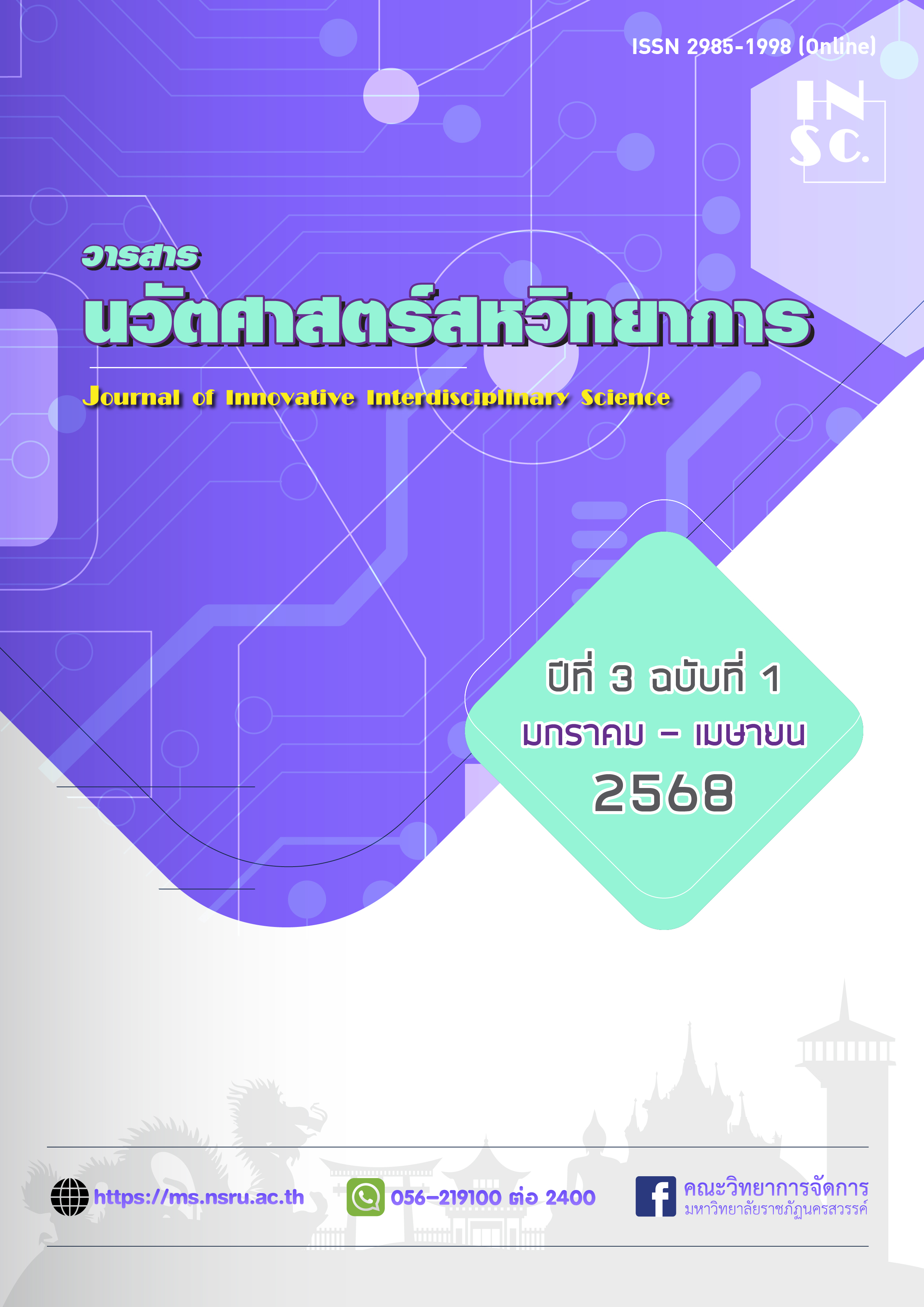Improving processes operational material procurement in electronic government procurement system of the Faculty of Management Sciences, Nakhon Sawan Rajabhat University
Main Article Content
Abstract
This study aims to examine the problems and obstacles in the procurement process of materials through the electronic government procurement (e-GP) system at the Faculty of Management Science, Nakhon Sawan Rajabhat University. Additionally, it seeks to explore approaches for improving the material procurement process within the e-GP system. Data were collected from 30 personnel involved in procurement and supply management, selected through purposive sampling. The research instrument was a questionnaire, and the data were analyzed using descriptive statistics, including frequency, percentage, mean, and standard deviation.
The findings reveal that:
- The majority of the sample were female (86.67%) and held a master’s degree (50.00%). However, there were limitations in knowledge regarding procurement laws and regulations, with only 33.33% possessing a high level of understanding, while 36.67% had low or minimal knowledge. Additionally, understanding of the e-GP system was relatively low, with only 26.67% demonstrating high proficiency. Furthermore, 60.00% of the personnel had never received procurement training, leading to inefficiencies in operations.
- The key issues in the e-GP procurement process can be categorized into three main areas: (1) Knowledge and operational limitations – These include a lack of understanding of relevant laws, regulations, and procedures, as well as an absence of a standardized vendor registration system. (2) System and technological limitations – These encompass the complexity of the e-GP system, connectivity issues, and inconsistencies in material inventory recording. (3) Budget allocation and planning limitations – The budget allocation process does not align with organizational needs, and there is a lack of coordinated planning between budget users and procurement staff.
- To enhance the procurement process, the study suggests adopting the PDCA (Plan-Do-Check-Act) cycle and the 5R principles (Right Quality, Right Time, Right Price, Right Quantity, Right Vendor). Key recommendations include systematic planning, process improvement, monitoring and evaluation, and continuous corrective actions. Furthermore, emphasis should be placed on selecting quality materials, purchasing at appropriate times, setting reasonable prices, ensuring optimal order quantities, and choosing reliable vendors.
In conclusion, the e-GP procurement system at the Faculty of Management Science still faces multiple challenges related to knowledge, technology, and budget management. Development strategies should focus on modernizing technology, enhancing transparency, and improving personnel skills through training programs to increase operational efficiency.
Article Details
References
กรมบัญชีกลาง. (2560). พระราชบัญญัติการจัดซื้อจัดจ้างและการบริหารพัสดุภาครัฐ พ.ศ. 2560.
สำนักพิมพ์ราชกิจจานุเบกษา.
กระทรวงการคลัง. (2560). ระเบียบกระทรวงการคลังว่าด้วยการจัดซื้อและการบริหารพัสดุภาครัฐ
พ.ศ. 2560. ราชกิจจานุเบกษา เล่ม 134 ตอนพิเศษ 210 ง วันที่ 23 สิงหาคม 2560.
กรกช อ่อนน่วม, & ฌาน เรืองธรรมสิงห์. (2562). ผลกระทบของการใช้ระบบอิเล็กทรอนิกส์ในการ
จัดซื้อจัดจ้างของภาครัฐ. วารสารการจัดการภาครัฐ, 14(1), 78-89.
กรรนิกา จันทร์ศิริ. (2563). การตรวจสอบการจัดซื้อจัดจ้างภาครัฐในประเทศไทย. วารสารการ
บริหารภาครัฐ, 14(3), 45-59.
กลุ่มงานเจ้าหน้าที่ สำนักงานอธิการบดี. 2567. อัตรากำลังข้าราชการและพนักงานมหาวิทยาลัย
ของคณะวิทยาการจัดการ. มหาวิทยาลัยราชภัฏนครสวรรค์.
จักรพันธ์ ระวีย์วรากร. (2560). การศึกษาแนวทางการปรับปรุงและพัฒนาการจัดซื้อจัดจ้างของการ
ไฟฟ้าฝ่ายผลิตแห่งประเทศไทย (กฟผ.). [การค้นคว้าอิสระหลักสูตรรัฐศาสตรมหาบัณฑิต, มหาวิทยาลัยธรรมศาสตร์].
จุฑามาศ พงศ์คาม. (2561). การประยุกต์ใช้ระบบ e-GP ในการจัดซื้อจัดจ้างภาครัฐ. วารสาร
เทคโนโลยีสารสนเทศ, 8(2), 101-115.
ณัฐดา ยอดเมืองชัย. (2561). ความรู้ความเข้าใจเกี่ยวกับพระราชบัญญัติการจัดซื้อจัดจ้างและการ
บริหารพัสดุภาครัฐ พ.ศ. 2560. ศูนย์บรรณสารและสื่อสารการศึกษา มหาวิทยาลัยพะเยา.
นทพร กิตติชัย. (2565). ปัญหาและอุปสรรคในการดำเนินงานจัดซื้อจัดจ้างผ่านระบบ e-GP. วารสาร
การศึกษาและเทคโนโลยีการศึกษา, 34(2), 145-162.
ปาริชาติ พิทักษ์พงษ์, & ภาณุวัฒน์ เจียมอารีย์. (2564). การศึกษาการใช้ระบบ e-GP ในการจัดซื้อจัด
จ้างภาครัฐ. วารสารการศึกษาและพัฒนาทรัพยากร, 33(4), 75-90.
ภาคภูมิ สุขสวัสดิ์. (2563). ผลกระทบของ e-GP ต่อการลดต้นทุนการจัดซื้อจัดจ้างภาครัฐ. วารสาร
การบริหารจัดการภาครัฐ, 12(1), 85-102.
รัตนา สุวรรณ. (2562). การประเมินประสิทธิผลของการใช้ e-GP ในการจัดซื้อจัดจ้างภาครัฐ.
วารสารวิจัยและพัฒนาในระบบราชการ, 21(3), 112-128.
รุ่งทิวา วงศ์ราษฎร์. (2559). ความสัมพันธ์ระหว่างการบริหารงานพัสดุที่ส่งผลต่อประสิทธิภาพการ
บริหารพัสดุขององค์กรปกครองส่วนท้องถิ่นในเขตภาคเหนือตอนบน. [วิทยานิพนธ์คุรุศาสตรมหาบัณฑิต, มหาวิทยาลัยราชภัฏเชียงราย].
วารี แว่นแก้ว. (2561). การปรับปรุงกระบวนการจัดซื้อจัดจ้างภาครัฐในประเทศไทยภายใต้
พระราชบัญญัติการจัดซื้อจัดจ้างและการบริหารพัสดุภาครัฐ พ.ศ. 2560. วารสารการศึกษาทางการจัดการ, 12(2), 45-56.
OECD. (2013). Government procurement and public service delivery: Policy
recommendations. OECD Publishing.


